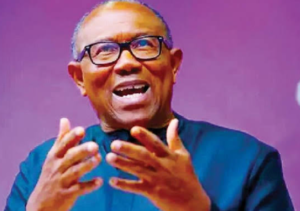Grid Collapse: A National Embarrassment and a Sign of Leadership Failure
Grid Collapse: A National Embarrassment and a Sign of Leadership Failure

Peter Obi
Once again, the national power grid has failed, leaving large sections of Nigeria in darkness and highlighting the vulnerability of the country’s power infrastructure.
This ongoing crisis is not only a national embarrassment but also a stark indicator of leadership and policy failures at the highest levels.
How much longer will Nigerians have to tolerate a system that cannot deliver one of the essential elements for a thriving society?
This latest grid failure reflects a government that has consistently neglected the well-being and economic prosperity of its citizens.
The significance of reliable power supply for economic transformation cannot be overstated. It is crucial for supporting small and medium enterprises (SMEs), which are vital for job creation and contribute significantly to our GDP.
Today, Nigeria stands as the fourth largest economy in Africa, a position it has fallen from due to years of poor leadership and the ongoing power crisis that hampers our potential compared to smaller economies.
For context, South Africa has become the largest economy on the continent, generating over 40,000 megawatts of electricity for its population of about 60 million, with a GDP of approximately $400 billion. Egypt follows closely as the second-largest economy, also generating over 40,000 megawatts for a population of around 100 million and a GDP of about $350 billion. Algeria, with a GDP of $300 billion and a population of around 45 million, produces over 50,000 megawatts.
In stark contrast, Nigeria, despite having a larger population than these three countries combined and a lower GDP, generates and distributes less than 10,000 megawatts. Even this inadequate supply is plagued by frequent outages and systemic failures.
This glaring disparity in power generation underscores a profound governance deficit that continues to stifle our growth and potential.
It is imperative that we pursue urgent and comprehensive reforms. Nigerians deserve a government that prioritizes tangible indicators of development.
A new Nigeria is possible. PO.
TRENDING SONGS
 NPMA Appeals to Nigerian Government for Compensation After Lagos Market Fire
NPMA Appeals to Nigerian Government for Compensation After Lagos Market Fire
 Rest Every Four Hours, FRSC Issues Safety Guide for Fasting Motorists
Rest Every Four Hours, FRSC Issues Safety Guide for Fasting Motorists
 NNPC Boss Ojulari Bags UK Energy Institute Fellowship
NNPC Boss Ojulari Bags UK Energy Institute Fellowship
 Shock in Anambra: Bride Disappears Moments Before Wedding
Shock in Anambra: Bride Disappears Moments Before Wedding
 Nigerian Woman Returns ₦330 Million Accidentally Credited to Her Account
Nigerian Woman Returns ₦330 Million Accidentally Credited to Her Account
 APC Don Reach Morocco?’ VeryDarkMan Reacts to Seyi Tinubu Poster
APC Don Reach Morocco?’ VeryDarkMan Reacts to Seyi Tinubu Poster
 Bride Breaks Down in Tears as Wedding Meals Were Kept Secretly While Guests Go Home Hungry
Bride Breaks Down in Tears as Wedding Meals Were Kept Secretly While Guests Go Home Hungry
 Odogwu by Day, Robber by Night: How Marriage Joy Turned Into Tragedy
Odogwu by Day, Robber by Night: How Marriage Joy Turned Into Tragedy
 Nigerian Officials Allegedly Pocket N4–6B Weekly Through Smuggling Cartels at Seme–Badagry Border
Nigerian Officials Allegedly Pocket N4–6B Weekly Through Smuggling Cartels at Seme–Badagry Border
 Ahmad Yerima: Naval Officer to Face No Sanctions After Clash with Wike – Matawalle
Ahmad Yerima: Naval Officer to Face No Sanctions After Clash with Wike – Matawalle
Share this post with your friends on ![]()













